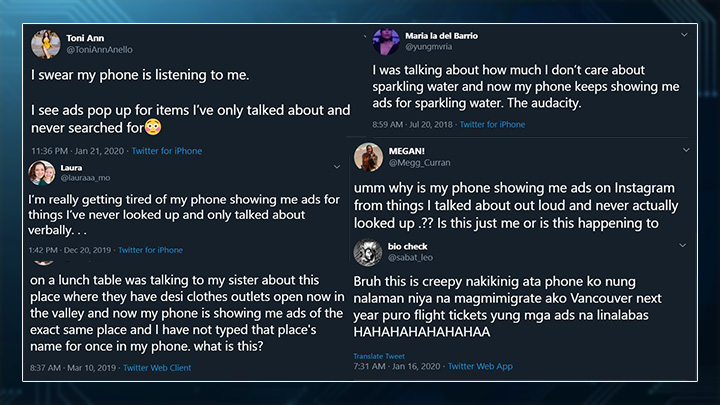Has it ever happened to you? You and your friend were just talking about something, say, having a vacation somewhere in Siargao, and later on, you look at your phone and see a plethora of ads in your social media of different stays and booking places in the same place. Coincidence? We think not.

Nearly everything we post on the internet today is recorded and stored for posterity. American whistleblower Edward Snowden refers to this as our Permanent Record. If you remembered FaceApp, you know that once you’ve downloaded and authorized the app, its creators have access to whatever they want. Deleting it afterward does very little to your privacy.
Technology companies, as we all know, use algorithms to target ads more effectively, and the more data they have about us, the more precise the campaigns are. This makes these ads much more influential than ads meant for the general public. And this is where those “sponsored ads” that you see kicks in.

Social media has been the bull’s eye for these advertisers, but as we know, this is tailored to benefit them and not consumers. And the results range from effective advertising, boosted shareholder profits, and swinging elections.
One great example of this is the Netflix documentary, “The Great Hack.” It gave us a glimpse of the way data is being weaponized for political gain. The information being collected is allowing ads to predict our behavior extremely accurately, instead of secretly listening to our conversations. Though you can turn off your access to your camera and mic to specific apps, the truth is that there’s always something or someone listening to these days.

For your smartphone to pay attention and record your conversation, there needs to be a trigger. For iOS, it should be “hey Siri” or “okay Google” for Android. Without these triggers, any data you give is only processed within your phone. This might not seem a cause for alarm, but any third-party applications you have on your phone—like Facebook, for example—still have access to this “non-triggered” data. And whether or not they use this data is really up to them.
Asterisk senior security consultant for cybersecurity firm Dr. Peter Hannay explains that Facebook and Instagram could have thousands of triggers. A simple conversation about wanting to eat buffalo wings could be enough to activate it. But as always, Facebook denies these allegations and is firm that it does not use your phone’s microphone for ads. The company says that it “shows ads based on people’s interests and other profile information–not what you’re talking out loud about.”

Meanwhile, Google claims “categorically” that it does not use any “utterances” from when the OK Google hotword is used, or share them with third parties. It was also discovered that Apple’s Siri recordings are reviewed by human workers, as well as Amazon’s Alexa. These recordings are transcribed and annotated by Amazon employees to improve Alexa’s understanding of human speech patterns. The same goes for Google Home.
Theresa Payton, former White House chief information officer, and current chief executive of Fortalice Solutions, said any equipment that has the capability of recording audio and video could record even when you’re not using the device. Even if the company itself has no ulterior motives for accessing your camera and microphone, these devices can still sneak behind your back. A malware on your device that allows somebody to remotely activate audio and video recordings could be one of the reasons.

And as we all know, our smartphone’s microphone can be set off unintentionally, especially when it hears a wake word, but it’s just you saying, “Hey, eerie” or “Hey, noodle.” There’s also a new study from Northeastern University and Imperial College London that shows that some smart TVs also send data to companies like Netflix, Facebook, and Google even when you are not using them.
Let’s cut to the chase. Yes, our smartphones are eavesdropping. And yes, everything we say or do with our phones could potentially be used against us. However, according to Asterisk’s senior security consultant for cybersecurity firm Dr. Peter Hannay, this is something we shouldn’t be terrified of because most of our data is going to advertisers. Through this, advertisers can harvest info about our interest so they can have a gist of what we want and when we want it.

In short, our data is a commodity, and that is pretty alarming. These tech giants and third-party apps already have tons of information about us. Our phones and the apps we used to collect and transmit our location, our purchasing behavior, our contacts, and the likes. What’s even more disturbing is that these tech giants aren’t transparent about what they’re doing and why they’re doing this.
And there you have it, guys. How do you feel about all of this? Is security now really just an illusion? Share your thoughts with us in the comments section below.

YugaTech.com is the largest and longest-running technology site in the Philippines. Originally established in October 2002, the site was transformed into a full-fledged technology platform in 2005.
How to transfer, withdraw money from PayPal to GCash
Prices of Starlink satellite in the Philippines
Install Google GBox to Huawei smartphones
Pag-IBIG MP2 online application
How to check PhilHealth contributions online
How to find your SIM card serial number
Globe, PLDT, Converge, Sky: Unli fiber internet plans compared
10 biggest games in the Google Play Store
LTO periodic medical exam for 10-year licenses
Netflix codes to unlock hidden TV shows, movies
Apple, Asus, Cherry Mobile, Huawei, LG, Nokia, Oppo, Samsung, Sony, Vivo, Xiaomi, Lenovo, Infinix Mobile, Pocophone, Honor, iPhone, OnePlus, Tecno, Realme, HTC, Gionee, Kata, IQ00, Redmi, Razer, CloudFone, Motorola, Panasonic, TCL, Wiko
Best Android smartphones between PHP 20,000 - 25,000
Smartphones under PHP 10,000 in the Philippines
Smartphones under PHP 12K Philippines
Best smartphones for kids under PHP 7,000
Smartphones under PHP 15,000 in the Philippines
Best Android smartphones between PHP 15,000 - 20,000
Smartphones under PHP 20,000 in the Philippines
Most affordable 5G phones in the Philippines under PHP 20K
5G smartphones in the Philippines under PHP 16K
Smartphone pricelist Philippines 2024
Smartphone pricelist Philippines 2023
Smartphone pricelist Philippines 2022
Smartphone pricelist Philippines 2021
Smartphone pricelist Philippines 2020
SwissBeatz says:
Yes definitely eavesdropping, and its a great legal hack of all time where the specific words u said or searched in ur mobile fone browser can be used to target ur for ads and for law enforcement profiling specially the NSA where Edward Snowden used to work.
One useful tip i could share with u guys is root ure fone, install a root level firewall and app running in background termination app and only allow few specific Google services to run ur fone to function properly but make it as per needeed basis (turned off by default) in that way u can eliminate ur fone eavesdropping on u, —also always turned off ur location / gps icon and use it when needeed.